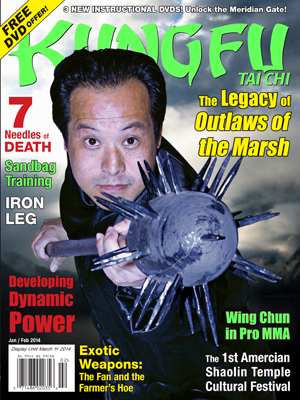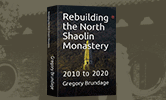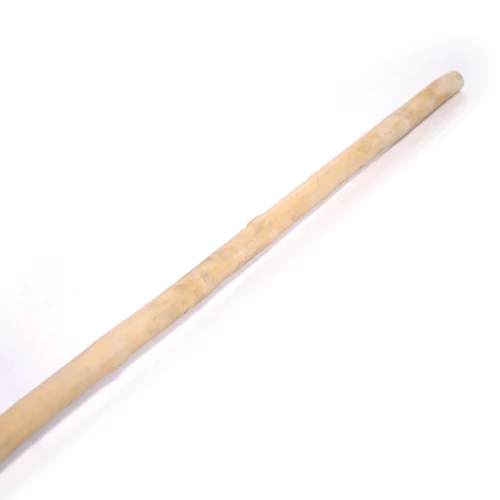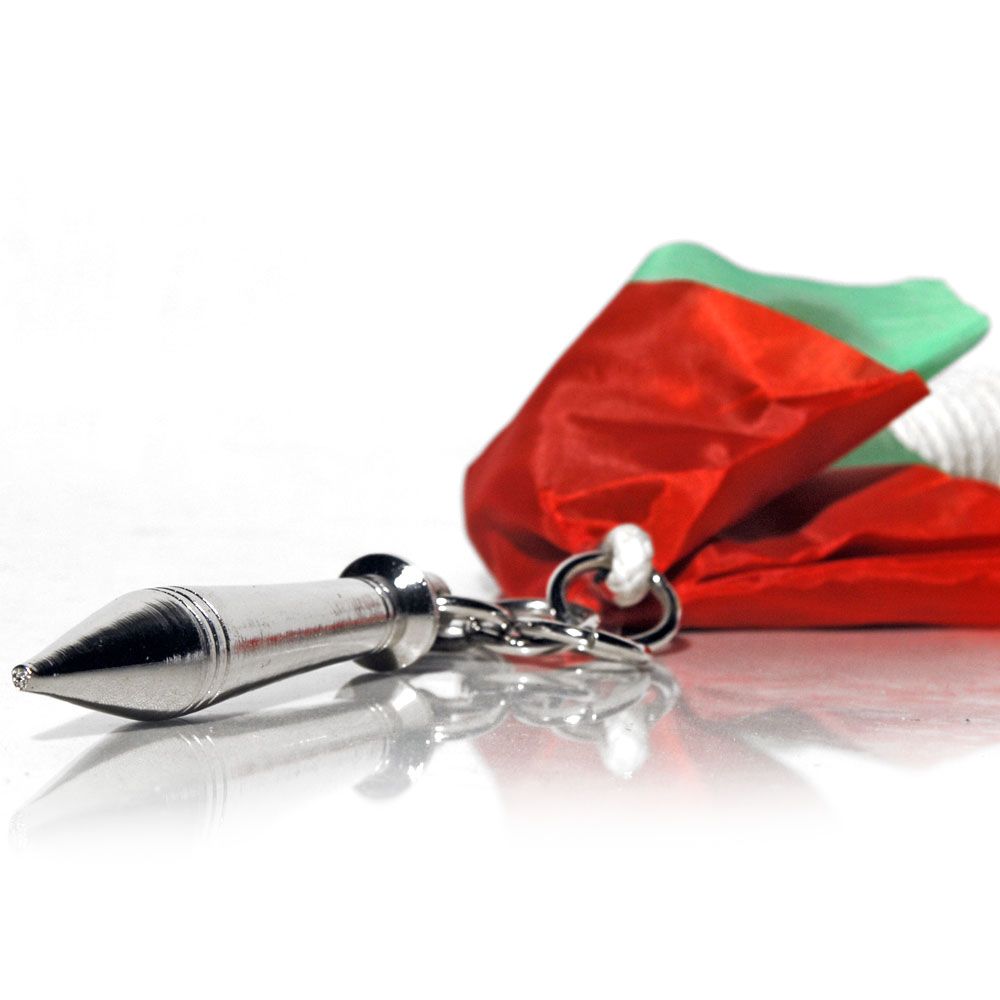By Gene Ching and Gigi Oh
download it from Zinio

To study Kung Fu is to study legend. The integration of myth is a conventional contrivance in traditional martial arts. In days of old, it was a practical means to transmit implicit morality (as all fables have a moral) to an illiterate medieval society.
This stratagem didn’t carry as much weight in Western culture (imagine wrestling techniques attributed to Jacob’s bout with an angel or archery methods based on Robin Hood), so the abundance of legends woven into Kung Fu has created a cross-cultural gap. Mythic underpinnings are confusing and cumbersome for those unfamiliar with Chinese culture. So many Kung Fu styles are attributed to legendary figures like the Daoist warrior Zhang Sanfeng (张三丰), the patron saint of martial arts, Guan Yu (关羽), or the founder of Zen, Bodhidharma (达摩),. These three seminal martial arts icons are unknown to most non-Chinese who are just starting out in the martial arts, and there are plenty of other styles attributed to far lesser known characters. A wellspring for Kung Fu lies within the pages of one of the four great classics of Chinese literature (四大名著). Outlaws of the Marsh is the most common English translation of Shui Hu Zhuan (水浒传), but it is also known as Water Margin and All Men are Brothers. Loosely based on a Song Dynasty (960-1279 CE) rebellion, Outlaws is an epic tale following the heroics of 108 revolutionaries who had a secret base in the marshes of Liangshan(梁山), a mountain in Shandong province. Just like in Arthurian legend, some of the hero outlaws are based on genuine historic figures while others are completely fictional. Shandong is well known for its warrior legacy. It is the birthplace of Mantis Kung Fu. Nowadays, if a Shaolin monk isn’t from Henan Province, where the temple is located, odds are he is from Shandong. Even Jackie Chan, although born in Southern China, boasts Shandong blood. And due to the impact of Outlaws, Liangshan is a hotbed for martial arts. “95% of the people in Liangshan practice martial arts,” claims Liangshan native Song Yixiang (宋义祥).
Master Song Yixiang is the 21st generation lineage holder of an indigenous Liangshan style of Kung Fu known as Ziwumen (meridian gate 子午门). Ziwumen is a classical Chinese system that combines combat skills with qigong cultivation and Chinese medicine, and, unsurprisingly, it is deeply rooted in Outlaws of the Marsh. While fairly unknown in the West, a descendant of Ziwumen attracted global attention. Bruce Lee’s 1972 film Fist of Fury was loosely based on the death of the turn-of-the-century master, Hou Yunjia (1868-1910 霍元甲). Hou was the inspiration for the founding of one of the world’s largest and most venerated martial organizations, the Chin Woo Athletic Association (精武體育會). According to Song, Hou was a 22nd generation Ziwumen proponent. Hou was famous for Mizongquan (lost track fist 迷蹤拳), which was the "fist of fury" depicted by Bruce Lee in Fist of Fury with psychedelic special effects. Mizongquan is a variation of Yanqingquan (燕青拳), which is named after one of the main heroes of Outlaws, Yan Qing.
Yan Qing was a great warrior, a wrestler and an archer, as well as a talented musician. It is unclear whether he was based on an actual historic figure or entirely fictional. He had pale white skin, almost albino, which was adorned with striking full body tattoos in kingfisher blue. He enters late in the Outlaws saga, nearly two-thirds of the way through, but becomes a significant character very quickly, instrumental in getting Imperial pardons for the outlaws. In the end, he slips away mysteriously, hiding his tracks so his fellow outlaws cannot follow, which some claim is the origin of the term Mizongquan. Song asserts that Hou’s family changed the name and that it was derived from Ziwumen.
Noon and Midnight, Qi and the Art of War
Surprisingly, the name Ziwumen doesn’t refer to Outlaws. Zi and wu are yin yang terms. Zi is yin, and also refers to the period of 11 PM to 1 AM, coldness, and life. Wu is yang, the period of 11 AM to 1 PM, heat, and death. Ziwu is referenced in a seminal 12th century work of traditional Chinese medicine, Ziwu Liu Zhu (子午流注) which propounds regulation of qi flow through the meridians in conjunction with the cosmological position of celestial bodies. Accordingly, internal practices of Ziwumen are held to a strict schedule for recital, only during those powerful ziwu periods. Song cites the classic Daoism reflective principles. In Daoism, the sun and moon of heaven are reflected in the yang and yin of the human body. The year has twelve months and 365 days. The body has twelve meridians and 365 acupoints. Qi circulates around the body like currents in the ocean, subject to the tides. Just as there are optimal times for boating or fishing to cultivate the ocean, there are optimal times for practice to cultivate the body. In combat, ziwu yin-yang dichotomies are reflected in advancing and retreating, motion and inertia, unyielding and yielding, and delusion and reality.
Master Song believes that Ziwumen goes back much further than Outlaws, all the way back to the end of the Zhou dynasty during the State of Qi (1046-221 BCE). Qi was the last major state to fall to the Qin Dynasty, the unifier of China, so those final battles remain significant to scholars of Chinese warfare and strategy. “Ziwumen is greatly influenced by Qi culture, taking martial arts as the core,” asserts Song. “Maintain favorable factors and minimize unfavorable, stay clear of the enemy’s main force and attack the vulnerable, and deploy preemptive strikes. The marsh and Liangshan Mountain are located at the junction of a hilly region of central Shandong and the plain of west Shandong. The crossings of the Yellow River and the Beijing-Hangzhou Canal have been strategic points throughout history. Ziwumen was created in those warring days of the State of Qi.” By some accounts, Sunzi (544-496 BCE), China’s greatest strategist and author of The Art of War (Sunzi Bingfa 孫子兵法), was born in the State of Qi. Consequently, Master Song is quick to quote Sunzi when describing his discipline. “Ziwumen methods are combined and adaptable, making the practitioner more versatile and aggressive, just as it was stated in The Art of War by Sunzi, ‘The military tactics are like water, for water in its natural course runs away from high places and hastens downwards. So also in war, the way is to avoid what is strong and to strike at what is weak.’”
An Alternate Version of Outlaws of the Marsh
Given its folktale origins, there are many different Outlaws of the Marsh. Even traditional versions dating back to the 15th century vary from seventy to a hundred to even a hundred-and-twenty chapters. For readers of English, numerous translations exist, including a dubious yet popular 1933 translation by The Good Earth author Pearl S. Buck titled All Men are Brothers, and a highly regarded 1980 translation by Sidney Shapiro known as Outlaws of the Marsh.
Master Song’s Ziwumen creation legend diverges from the standard tale. In his version, several of the outlaw heroes become monks at Jianfu Temple (建福寺) on Liugong Mountain (六工山). Liugong is a range of twelve mountains at the northern gate of Liangshan (the character shan (山) literally translates into "mountain," but often refers to a mountain range). The six pairs of peaks resemble the Chinese character for "labor (gong 工)," earning these mountains their moniker (liu means "six"). While the novelizations of Outlaws of the Marsh do have some of the heroes enter monastic life (most notably Lu Zhishen鲁智深a.k.a. the tattooed monk Sagacious Lu), Jianfu Temple or its abbot, Ziwumen founder Zen Master Yuantong (园通禅师), are never mentioned in common versions of the tale.
According to Master Song, Abbot Yuantong was a Buddhist master born in Linzhou, Zhangde Prefecture, whose civilian name was Wang Xingbang (王兴邦). He was formally educated in Buddhism, Confucianism and Daoism by accomplished teachers. During the reign of Song Emperor Huizong (1100-1126 CE), he went to Dong’e in West Shandong to investigate claims of corruption at Jianfu Temple. The abbot there was old and powerless, so some fraudulent monks managed to collude with local criminals to tyrannize the civilians. Yuantong took over as abbot, purged Jianfu Temple of dishonesty and restored the Buddhist faith there.
A large portion of Outlaws of the Marsh is dedicated to the recruitment of rebels. The outlaw leader, Song Jiang (宋江), is a righteous champion under an oppressive government, so, like Robin Hood, he and his followers are labeled outlaws despite their heroic efforts. Song Jiang was based on an actual person; he is mentioned in several historical documents from the period. Coincidentally, Master Song Yixiang shares the same surname. Many chapters of Outlaws repeat the similar story arc in which Song Jiang gathers his fighters. Song Jiang hears of another martial arts master who is righteous, and courteously asks him to join. Being a good citizen although under tyrannical rule, that master typically refuses at first, and several entreaties are made. But then he encounters some government-induced tribulation and soon comes to the realization that Song Jiang’s path is honorable. Despite lying outside of Outlaws' common narrative, Master Song’s tale of Yuantong is parallel.
“Song Jiang was recruiting heroes to aid the needy from Liangshan Marsh. Hearing that Yuantong and the monks at Jianfu Temple were accomplished martial artists and that Yuantong was merciful, Song Jiang sent Sagacious Lu to entreat him. When discussing their discipleship, Lu and Yuantong discovered that they were bonded by the same lineage. After Lu reported this back to Song Jiang and Wu Song, they visited Yuantong too soon after. Lin Chong and Yan Qing also petitioned Yuantong, but he still refused to join. Nevertheless, Song Jiang frequently sought Yuantong’s tactical advice and sent the outlaw chiefs to study martial arts under him, and the Abbot never hesitated to offer his wisdom or instruction. Jianfu Temple became a regular gathering place for the outlaws.
“In the sixth year of the reign of Emperor Xuanhe (1125 CE), Song Jiang’s troops were dismissed and the remaining chiefs were converted to Buddhism to practice Buddhism and martial arts. Lu Zhishen, Wu Song, Yan Qing, Shi Qian, Lin Chong and some other heroes became monks at Jianfu Temple. Abbot Yuantong taught them qigong, incorporating it into empty hand and weapons forms. After practicing these innovations for some time, their combat skill improved dramatically. In the fourth year of the reign of Emperor Jianyan (1130 CE), Wu Song returned from Hangzhou and Yuantong taught him all these newly fused combat and qigong techniques.
“In the first year of the reign of Emperor Shaoxing (1131 CE), Ziwumen was established. Abbot Yuantong recommended Wu Song to act as the lineage holder, so Wu Song became the first generation lineage holder, and Master Yuantong was known as the first ancestor.” Wu Song is one of the most martial outlaws, a drunken boxer famous for killing a man-eating tiger barehanded. A unique form of Kung Fu called Wu Song Breaks Manacles (武松脱拷) reenacts a chapter in Outlaws where Wu Song fought his way out of captivity while being manacled. In the beginning of the form, practitioners only use leg techniques while holding their wrists together as if shackled. And then midway through, the practitioner pantomimes breaking free of the cuffs. In rare versions of this form, it is done as a choreographed sparring set. According to the standard narrative, Wu Song survived to retire to Liuhe Temple (六和塔) in Hangzhou. Like Yan Qing, it is unclear whether Wu Song was real or fictional.
The Lineage of Outlaws
Today, Ziwumen is classified as an Intangible Cultural Heritage of Shandong Province, largely due to its present lineage holder, Master Song Yixiang. Highly decorated in the martial arts, Song was recognized as one of China’s Top Ten Coaches in 1997, the same year he captured first place at the National Heavenly Dragon Cup Martial Arts Competition. The following year, he was employed as a technical consultant by the magazine, Shaolin and Taiji. In 2000, he won first again at the National Invitational Tournament of Xingyiquan and Baguazhang. Three years later, the China Association of Martial Arts Masters honored him as one of the Top Ten Masters with exceptional contributions. These outstanding achievements are particularly astonishing given that Song was destitute as a child. But a twist of fate allowed him to wander China as an itinerant student, and this was before he reached adulthood.
Song’s father was killed during the Cultural Revolution. He had been categorized among the Black Five (黑五类): anti-revolutionaries, bad elements, landlords, rich farmers, and right-wingers. Song was only six. Two years later, a wandering Daoist master named Qi Zhen (奇真) passed through his village and offered to take Song along. As Song’s family was very poor, he could just leave. That began a journey of eight years, following Qi Zhen across China, visiting masters in the wake of the Cultural Revolution, mostly traveling on foot. Qi Zhen used to be head of a Daoist Temple, but it was destroyed during the Cultural Revolution. He had managed to hide some silver, and they lived on that. While this might seem strange today, Song believes it was a blessing and fate. “I feel I am very lucky. Most Chinese were starving to death. Any child had to work at a very young age, picking up firewood or doing whatever they could to survive. I got to travel and train. We slept in the mountains. We hunted and gathered. It seems hard now, but there was a lot of freedom, a lot of joy.”
Despite the hardships, Song’s childhood sounds like any Kung Fu practitioners’ dream vision quest. Before taking his position, a lineage holder must travel around the country to learn from martial arts masters of other major schools. According to Song, this reflects the Confucian idea of “as three men are walking together, one of them is bound to be good enough to act as my teacher.” Song followed Qi Zhen to Shaolin Temple, Wudang Mountain, and Tianjin. He was able to study under some of the greatest grandmasters of the last generation. He trained with two of the 9th duan masters, the highest ranking awarded in China today: Cai Longyun (蔡龙云) and Zhang Wenguang (张文广). He was also coached by noted masters Yang Fuqian (杨福乾) and Wan Laisheng (万籁声). He even studied under one of Shaolin Temple’s most regarded masters, Shi Suxi (释素喜). And, of course, Qi Zhen was the 20th generation lineage holder of Ziwumen. Song was formally accepted as his disciple at age twelve. Qi Zhen appointed Song as the official inheritor in 1987.
“Ziwumen is more combat oriented than anything else, but it is primarily internal,” explains Song. “Only a small portion of the internal practice needs to be practiced between 11 and 1. That’s the internal work. Most styles combine hard and soft. Most internal styles begin soft, and then they progress to explosive power. Ziwumen doesn’t do this. Strike already. It has the power, so transmit the power. Nowhere is not your dantien (literally ‘elixir field’ referring to the center of qi 丹田).”
In 1987, Master Song opened his first school, in Cailou Village, Zhaogudui Township, Liangshan, to propagate Ziwumen. Four years later, he established the Research Association of Chinese Liangshan Ziwumen Kung Fu to systematically study the style. And three years after that, Song established the Liangshan Kung Fu Institute, over which he now presides. Master Song estimates that there are currently over 100,000 active practitioners of Ziwumen in China today, mostly concentrated in Shandong.
Between Legend and Reality
Master Song is well aware of the mythic basis of his style. “Some of the characters are real in Outlaws. Those were real historic heroes.” But beyond the tall tales, it is the morals of the epic that he finds most worthy of preserving.
“Ziwumen incorporates the Confucian spirit of benevolence, loyalty, forgiveness, righteousness, ritual and sincerity as its martial ethics. Song Jiang led the heroes to accept the amnesty and the enlistment for rebels offered by the emperor reflects loyalty. The loyalty between master and apprentice is represented by such ideas as ‘a master and an apprentice are like a father and a son’ and ‘a master for a day is a lifelong father.’ Liangshan Ziwumen stresses that ‘disciples of the lineage must be absolutely loyal to their masters and all traitors deserve to be killed by any person.’ The heroes in the novel Outlaws of the Marsh are known for their lofty and righteous personalities. They hated evil like an enemy, upheld justice, helped people in danger, sacrificed themselves for one another, valued righteousness and belittled profiteering.”
Practitioners who are unfamiliar with their mythic ancestors do themselves a great disservice as they might miss a key lesson of the style. Training how to fight is fundamental. But ultimately, it’s understanding when and why to fight that is most important. For centuries, Outlaws of the Marsh has inspired fans with acts of altruism and heroism. And today, the world needs that more than ever.
| Discuss this article online | |
| Kung Fu Tai Chi Magazine January/February 2014 |
Click here for Feature Articles from this issue and others published in
2014 .
download it from Zinio
About
Gene Ching and Gigi Oh :
![]()
![]() Print Friendly Version of This Article
Print Friendly Version of This Article
















